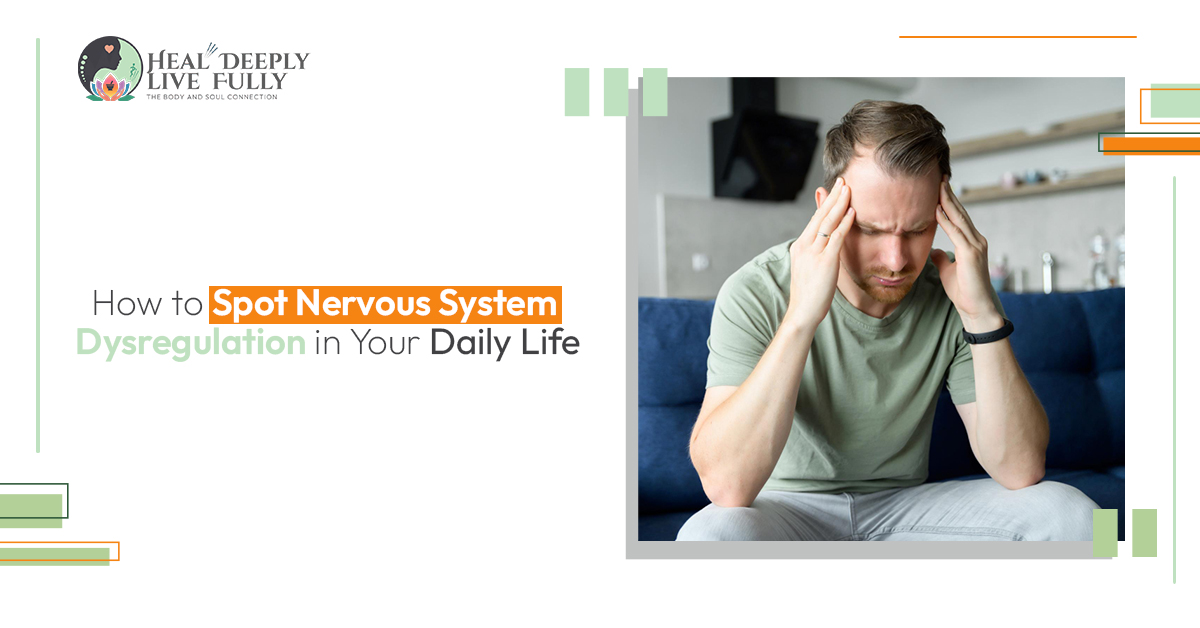Your nervous system decides how your body responds to stress. When it works right, you feel steady. When it doesn’t, everyday things feel hard.
Maybe you’ve noticed feeling different lately. More tense, tired, or just off. Your nervous system might be trying to tell you something.
What Dysregulation Looks Like
Your nervous system has two settings: calm and alert. Both are normal. Problems start when you get stuck in alert mode.
Small things feel big. A work email makes your heart race. Traffic feels unbearable. Your body treats everyday stress like real danger.
Body Signs
Dysregulation shows up physically:
- Can’t fall asleep, wake up tired
- Nausea, appetite changes, digestive issues
- Shoulders, jaw, neck tension
- Even when sitting still
- Temperature changes without reason
- Feel like you can’t get enough air
Your body stays ready for threats that aren’t really there.
Mental Signs
Your thinking changes, too:
- Everything feels huge: Simple tasks seem impossible
- Quick anger: Small things set you off
- Can’t focus: Mind jumps around, hard to decide things
- Always watching: Scanning for problems everywhere
- Feel distant: Like you’re not really present
- Big emotions: Reactions don’t match what happened
When your system is stuck, emotions get louder and thoughts get fuzzy.
Relationship Changes
Dysregulation affects how you connect with people:
- Say yes when you mean no: Avoid conflict by agreeing
- Cancel plans: Everything feels like too much
- Hard conversations: Get defensive fast or go quiet
- Boundary problems: Either rigid walls or none at all
- Feel alone: Even with people who care
These habits try to protect you but often push people away.
How We Help
At Heal Deeply Live Fully, we work with your whole self..
We have a team of clinicians who provide acupuncture, chiropractic, massage, nutrition work, and bodywork services.
Some clients need trauma work. Others need help with their body or what they eat. We figure out what works for you.
Starting Small
You can get better.
Let’s talk about the small changes that help:
- Breathe slower
- Move gently
- Notice tension
- Sleep at the same time
- Less caffeine
These won’t fix everything, but they’re a start.
When Should You Get Help
Sometimes you need more than self-care. That’s normal.
Professional help gives you better tools. Someone to guide you through hard parts. Support when things feel overwhelming.
Different things can help different people.
What Healing Can Look Like
Getting better isn’t about never feeling stress. It’s about responding right when stress happens.
You sleep better. Small problems stay minor. You feel more like yourself. Relationships get easier.
Your body learns it’s safe to relax again.
Get Support
Your nervous system can balance again. We use different approaches to help you feel steady at Heal Deeply Live Fully
These patterns don’t have to stay. Contact us to talk about what might help you.
FAQs
How do you really know if your nervous system is dysregulated?
- Sleep problems, waking up tired
- Stomach issues, eating changes
- Feel overwhelmed by minor and normal things
- Can’t focus, hard to decide
- Big reactions to minor problems
- Tired but wired feeling
How to calm a dysregulated nervous system?
- Breathe slowly and breathe deeply
- Move your body gently
- Keep constant and regular sleep times
- Cut back on caffeine
- Get professional help for better tools
How to tell if your nervous system is shutting down?
- Feel numb, disconnected
- Very tired, sleep doesn’t help
- Can’t make choices, even the simple ones
- Avoid people and social things
- Feel like you’re watching your life happen
Does a dysregulated nervous system cause fatigue?
- Yes, being alert all the time is exhausting
- Sleep doesn’t even refresh you
- Hard to think clearly
- Body feels heavy and worn out
- Regular rest doesn’t help enough

